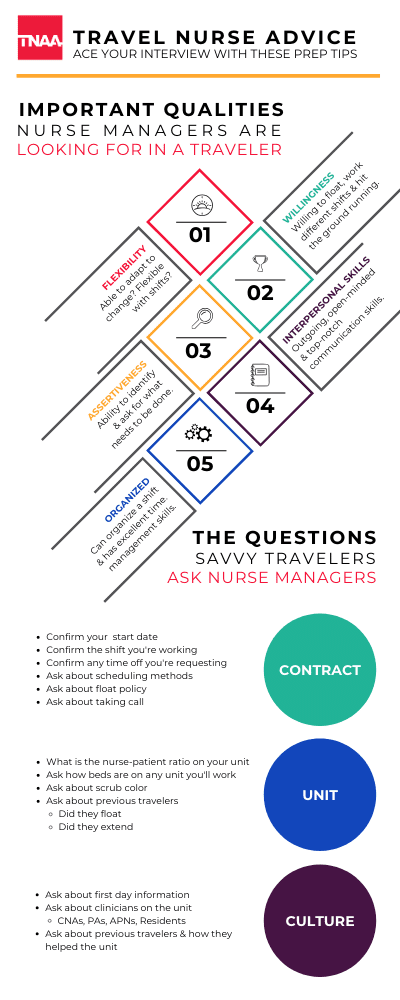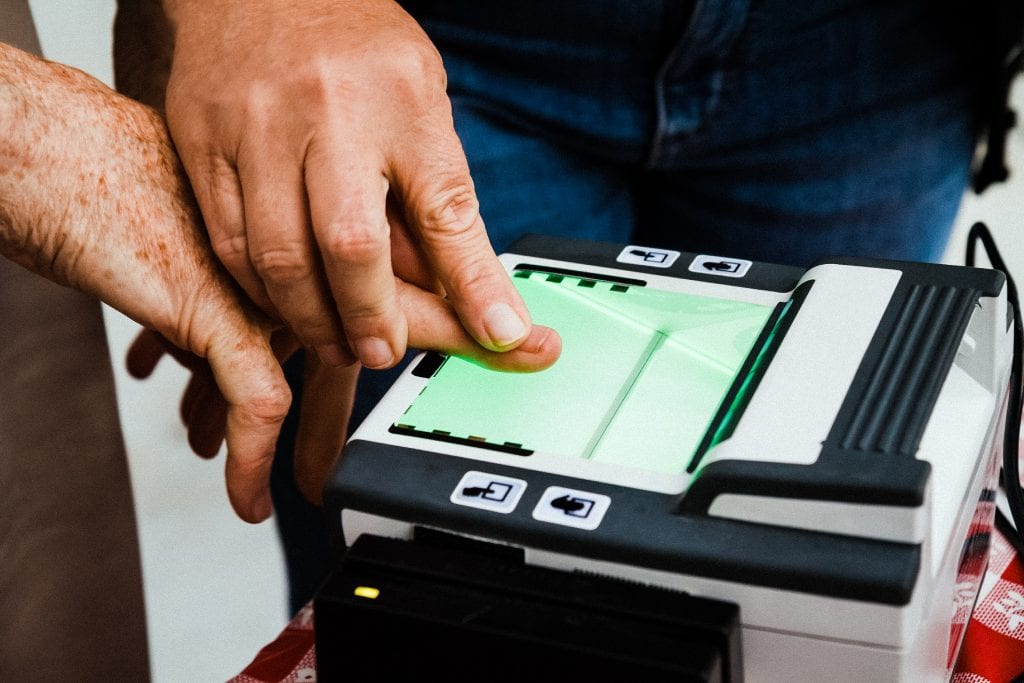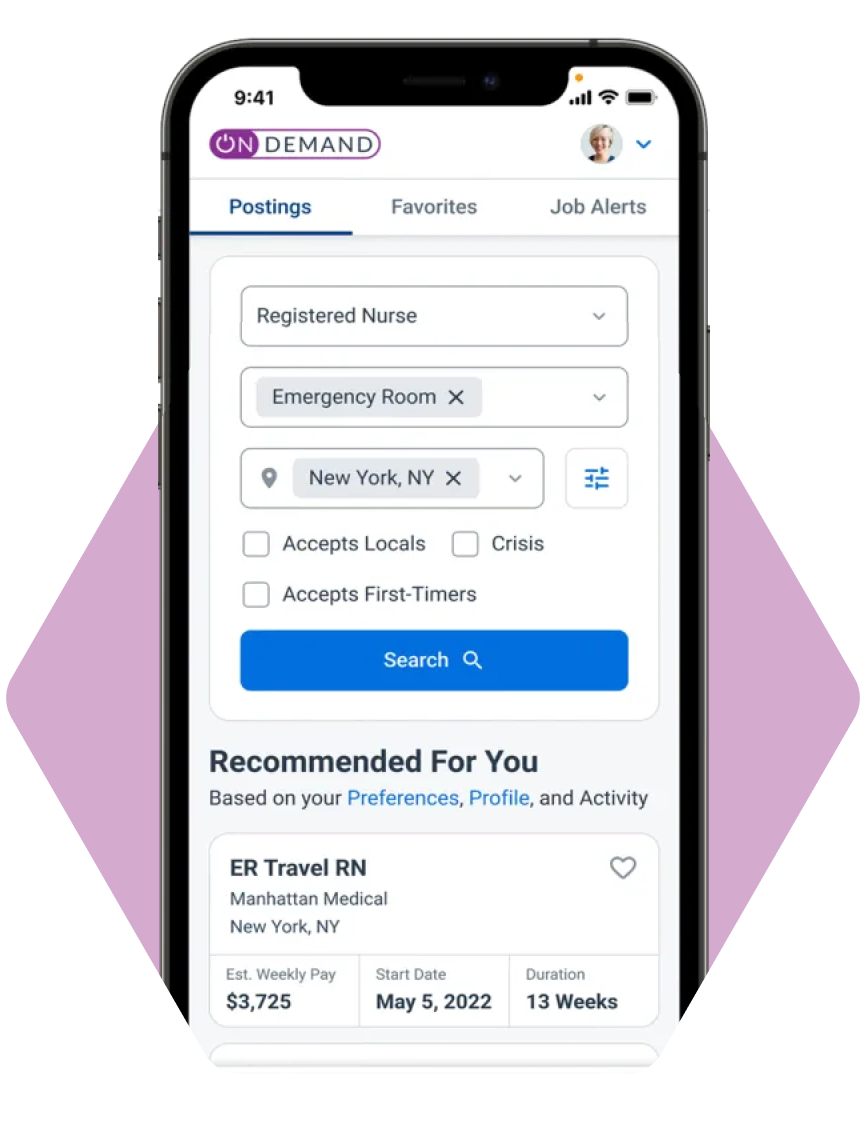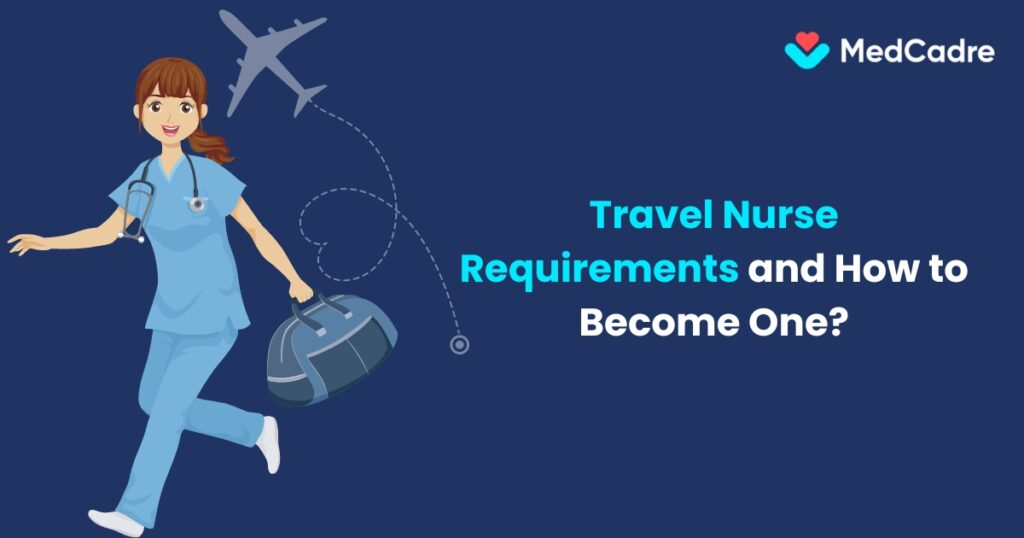
Home / Nursing Careers & Specialties / Travel Nurse

Travel Nurse
What is a travel nurse, how to become a travel nurse, travel nurse faqs, what does a domestic or international travel nurse do, travel nurse salary and employment, helpful organizations, societies, & agencies.

Travel nurses are RNs from various clinical backgrounds who work for independent staffing agencies. They are assigned to different care areas on a temporary basis to fill in short-term employment gaps.
Travel nursing is a specialty that took root when the field of nursing faced a nationwide shortage. Hospitals, clinics, and other care areas had unfilled positions, yet had patients needing care. To try and attract nurses to the open positions, employers offered higher pay, housing, and covered the cost of relocating.
Due to these shortages, health care facilities have vacancies that need to be filled—and travel nurses are often the ones to fill open positions. Not only do travel nurses work in health care in any state in the country, but they also work outside of the United States as international travel nurses. The adventure and excitement of new opportunities, along with higher-than-average pay, are facets of travel nursing that many RNs find attractive.
Why Are Travel Nurses Important?
Travel nurses are an important part of the health care team because they help bridge the gap between supply and demand in the field of nursing. Mandatory nurse-patient ratios have led to increased patient safety and lower patient mortality . While this is a positive finding, and more and more states are passing legislation to implement staffing ratios, there are not enough nurses to fill the openings. Travel nurses assigned those open positions help to increase patient safety and improve patient outcomes.
Additionally, nurses from different educational backgrounds, care areas, and geographic locations bring a great deal to the practice of nursing. Sharing ideas and practices not only benefits patients, but also other nurses.
A travel nurse should have the following characteristics to excel in the role:
- Enjoys experiencing new cities, towns, and organizations
- Enjoys freedom. Travel nurses choose when and where they work, and choose their duration of employment
- Enjoys flexibility. Travel nurses create their schedules, benefits packages, and income based on which agency they choose to work
- Thrives on challenges. Moving to different states or overseas and being “the new nurse” repeatedly is challenging. Learning new organizational systems and workflows is particularly challenging
- Loves learning new things. Each assignment takes travel nurses to new health care facilities, some with higher levels of technology or different standards of practice. Each experience helps nurses build upon their knowledge base
Additionally, travel nurses should have supportive families and friends. It's difficult to either pack up and move an entire family or leave your family and friends behind. The flip side to this is that new relationships are formed in each new location.
What Are the Educational Requirements for Travel Nurses?
Those interested in the specialty of travel nursing should first pursue a nursing degree through a two or four-year university. Obtaining an associate's degree ( ADN ) or bachelor's degree ( BSN ) in nursing is required. A BSN is not required to be a travel nurse, but some health care facilities only hire BSN-prepared nurses. The staffing agency in which the nurse is employed should match the nurse appropriately based on educational requirements.
After completion of an accredited nursing program, successful completion of the NCLEX-RN is required for licensure.
Most travel nurse agencies require a minimum of one year of hands-on experience in the chosen specialty of nursing. Additionally, some agencies will only hire BSN-prepared RNs. International travel nurses should speak the language of the country they are to practice in, as communication is an important part of effective healthcare delivery. Nurses are encouraged to research agencies when considering travel nursing.
Are Any Certifications or Credentials Needed?
No additional exams are required for travel nursing. Based on the specialty, certification(s) may be required. Examples include:
- Basic Life Support (BLS)
- Advanced Cardiac Life Support (ACLS) may be required
- Stroke care certification
- Telemetry certification
- Advanced Cardiac Life Support (ACLS)
- Pediatric Advanced Life Support (PALS)
- Critical care nursing (adults, pediatric, neonatal)
- Pediatric Advanced Life Support (PALS) may be required
- Neonatal Resuscitation Program (NRP) certification
- Neonatal Resuscitation Program (NRP)
- Trauma Nurse Core Course (TNCC) certification
Additional specific requirements may be necessary for international travel nurses. These include:
- Acquiring a passport and work visa (usually handled by the agency)
- Additional immunizations
- Learning a new language
- Learning about diseases unique to the area
How Can a Travel Nurse Receive a Tax-Free Housing Stipend?
Housing is one of the most significant concerns for a travel nurse. There are a few options available, and it depends on the travel nurse agency/company regarding how accommodations are set up. Some companies provide housing (i.e., apartment, duplex, etc.). Some companies offer a housing stipend, or a fixed amount of money each month to apply towards housing.
First, nurses need to be aware of where their “tax home” is, as stipends are tax-free if working away from the tax home. Having a tax home is necessary to receive tax-free housing. A "tax home" is defined as the general vicinity of an individual's primary place of work (regardless of where the primary residence is). Generally, the IRS considers someone traveling away from home (i.e., their "tax home") if it exceeds one workday.
Different travel nurse agencies offer different stipends - it’s important to research what the living expenses are in a specific area to ensure housing is adequately covered. The General Services Administration (GSA) lists the maximum daily amount for lodging, meals, and incidentals with regards to travel expenses . The key word is MAXIMUM. It's not required that a company pay employees the listed stipend. In fact, some travel nurse agencies offer higher hourly wages instead of housing stipends. Additionally, the GSA rates are based on short-term travel - usually less than a month. Travel nurse contracts can last three months or more.
Are Nursing Licenses Valid When Traveling and Working in Other States?
Those interested in travel nursing may have questions about licensing; specifically, how are licenses recognized if practicing in another state.
Depending on the state, new licensure is not necessary. The National Council of State Boards of Nursing (NCSBN) developed the Nurse Licensure Compact which is an agreement between specific states to recognize nursing licenses without having to apply separately for licensure in another state. In other words, a nurse living in a "compact state" (one which is part of this agreement) can practice in another compact state without having to obtain additional licenses. There are now uniform licensure requirements that must be met when seeking a multistate license under the compact agreement. States that participate in the compact agreement can be found on the NCSBN website .
If not part of the compact agreement, some states allow nurses to obtain temporary licenses by endorsement. These are valid for specific lengths of time, so nurses must visit each state’s Board of Nursing website to determine specific temporary license requirements. If extending the assignment past the temporary license time frame, nurses must apply for a permanent license. Permanent licenses are also required for states that don't grant licensure by endorsement and don't participate in the NLC.
Travel nurses have a broad range of responsibilities and duties, and specific tasks depend on the specialty in which the nurse is trained. General nursing responsibilities and duties include:
- Using the nursing process of assessing, diagnosing, planning, implementing, and evaluating to care for patients in a variety of healthcare settings
- Administering medications, and fluids, assisting with activities of daily living and patient mobility
- Reviewing and interpreting diagnostic tests such as lab work and imaging
- Provide monitoring and oversight in all aspects of patient care
- Collaborating with physicians in developing a plan of care
- Assessing the psychosocial needs of patients and families
- Recognizing and intervening in clinically unstable patients
- Providing resources for patients and referring as necessary
- Educating patients and families in all areas of healthcare maintenance and prevention
- Working in assignments anywhere from eight to thirteen weeks (on average) in the U.S., one to two years if outside the U.S.
- Learning various patient care systems/documentation
- Providing immediate medical care and aid for large populations during times of war or disaster
Domestic and international travel nurses also have different characteristics specific to their roles.
Domestic Travel Nurses
- Work within the U.S.
- Typically work assignments that range from eight to thirteen weeks
- Can respond to areas of the U.S that experience natural disasters or disease outbreaks
International Travel Nurses
International travel nurses should have excellent communication skills, should be open to new experiences and challenges, and should have a strong desire to learn. These nurses are responsible for performing a wide array of duties. As stated previously, the tasks an international nurse will have to perform depend entirely upon their medical specialty. Some of the more general or everyday tasks that international travel nurses will perform include administering medication, wound care, and providing emergency medical services and care. Since there are often nursing shortages in many of the regions that international nurses travel to, another general role of these nurses is to educate family members and caretakers about the appropriate patient and medical care. In summary, international travel nurses:
- Work outside the U.S.
- Typically work assignments that range from one to two years
- Respond to areas that experience natural disasters or disease outbreaks, such as the Ebola outbreak in West Africa
- Provide medical care and aid to underserved, rural , and remote populations
- Usually, must wait for document processing before traveling
Travel Nurse Working Conditions
As with any career, there are positive and negative aspects to working as a travel nurse. Nurses can suffer from stress as they may carry a heavy patient load and have many critical decisions to make. Additionally, travel nurses may suffer from feelings of isolation since they tend to relocate often. Having a strong sense of independence and a support system available, even remotely, can help.
Additionally, nurses may work in high-risk areas that may expose them to workplace violence, blood-borne pathogens, and chemicals. Travel nurses must always familiarize themselves with and adhere to safety standards set by the organization.
International travel nurses can face different challenges. Travel nurses must be familiar with the country's laws, and geographic-specific diseases, and always keep their overall safety as a priority.
Despite these considerations, travel nursing can be immensely rewarding. Many organizations and staff nurses appreciate the help travel nurses offer. Travel nurses help relieve staff nurses from burnout, as can happen when working short-staffed.
International travel nurses are also highly appreciated. They provide medical care and assistance to many patients in remote settings who otherwise would have no access to healthcare. They help with relief efforts in war zones or after disaster events, which can be both rewarding and enriching.
According to the American Nurses Association, as of 2015 fourteen states had mandatory nurse-patient ratios . Nurses are pushing for federal legislation supporting safe staffing and because of this, if more states pass safe-staffing laws, nurses will be in even more demand. Travel nurses will help mend the current and projected nursing shortage. The Bureau of Labor Statistics projects a 16% overall growth for nurses until 2024, which is much faster-than-average growth for all occupations.
RELATED : RN License Transfer and NLC Guide
Travel nursing has many incentives for nurses regarding pay and benefits including:
- Travel reimbursement
- Free housing
- Medical, dental, and vision coverage
- Retirement plans
- Assistance in obtaining passports/work visas
- Choice of location
- Selection of hours/shifts worked
- Competitive pay
- Higher-than-average pay for RNs
According to Indeed, the average yearly salary for a travel nurse is $75,109. However, since pay is competitive in travel nursing, some companies are offering salaries of around $100,00 annually for domestic travel nurses.
International travel nurses tend to have lower salaries than domestic, except for assignments in some middle eastern countries. This is because, for the most part, nurses tend to make less outside of the U.S.
Salary is dependent on the agency, and nurses should research each company to find the right salary and benefits that best fit their needs.
- International Council of Nurses
- Professional Association of Nurse Travelers
- National Association of Travel Healthcare Organizations
- American Travel Health Nurses Association
Related Articles
- The Hottest Job During a Pandemic? Travel Nurse
- Is Travel Nursing the Right Adventure for You?
- An Ocean-Lover's Dream: Working as a Nurse at Sea
- 10 Pros and Cons of Becoming a Travel Nurse
- 5 Specializations For Nurses Who Enjoy Travel
- Tips on Maintaining a Healthy Diet as a Traveling Nurse
- See all Nursing Articles
- Recruitment Team
- Our Approach
- View Nursing Jobs 0 Jobs
- View Allied Jobs 0 Jobs
0 Jobs Available
Nursing Jobs
Allied Jobs
- Mental Wellness Support
- Paid Sick Leave
- Your Way Is Paid
- Travel Reimbursement
- Pay Packages
- Benefits Summary
- Referral Bonus+
- Continuing Education
- Employee Assistance Program (EAP)
- Chaplain Assistance Program
- Client Facilities
- Corporate Careers
- Press Releases
- Contact Information
- Merchandise
- Get Started
- Preferences
- Favorites 3
- Returning Applicants
Travel Nursing 101: How to Be a Travel Nurse & More

Getting Started in Travel Nursing
The nursing field offers this unique career path that allows you to travel the country while expanding your nursing skills. What’s better than that? Whether you’re just starting to explore the world of travel nursing or about to head off on your first assignment, it can be daunting to navigate this nuanced industry. And by nuanced we mean crazy but awesome. To make sure you start off on the right foot, we put together this guide covering all the basics of travel nursing.
This guide covers a lot of information. Use these links to find what you’re looking for faster.
- Part 1: Travel Nursing 101 — What is travel nursing?
- Part 2: How to Become a Travel Nurse — breaking down the requirements & how to get started.
- Part 3: Working With an Agency — and why you need an amazing recruiter.
- Part 4: Landing Your First Job — it’s interview 101 & contracts.
- Part 5: Travel Nurse Pay Packages — how to dissect a pay package.
- Part 6: Important Links — tax info & more.
- Travel Nursing FAQs — Can I take travel nurse assignments close to my house? What’s orientation like? And so much more.

Part 1: Travel Nursing 101
It’s important to always remember that travel nursing is all about filling a need. There’s a nursing shortage — have you heard? The demand for registered nurses will grow by 15% from 2016 – 2026. From aging baby boomers to nurse burnout, the need for highly-skilled and experienced nurses continues to rise. Oh, and there’s also seasonal needs and expected leaves (like maternity leave) to factor into the equation. Enter travel nurses.
What is a Travel Nurse?
Licensed and experienced, travel nurses work as contingent staff to maintain quality patient care standards during staff shortages. In plain English, they fill the gaps on the schedule, typically for 13 weeks at a time.
- Highly-Skilled : You’ll need to be confident in your skills and ready to hit the ground running. Travel nurse orientations are notoriously brief, and you’ll be expected to hit the floor quickly.
- Adaptable : Things will not go as planned, from housing to expectations. Good travel nurses can not only adapt quickly but know who to contact at their agency to ensure they have the proper support.
- Adventurous : Making new friends, learning new cities, and working with new equipment — it all comes with the territory. So make sure you pack your sense of adventure.
- Independent : The life of a gypsy nurse often means being away from friends, family, and sometimes special moments. When you get home after a shift and are alone, you’ll need to remember that you’re independent.

Why Choose Travel Nursing?
There are so many reasons nurses choose this career path. We believe it’s because it’s one of the best careers out there. We see nurses hit the open road for financial freedom — paying off debt, building retirement, or being able to afford the life they want to live. Many nurses want to develop their experience, from working at a prestigious hospital to working with the latest tech. And sometimes, travel itself is the motivator.
Check out our tips for maximizing your travel career on The Gypsy Nurse. It’s all about determining your motivations and how to find an agency that complements those driving factors.

Part 2: How to Become a Travel Nurse
After determining your motivators and some research, you’ve decided you want to clock out for the last time on your staff position. Welcome to the most fun, challenging, and rewarding job you’ve ever had. But first, let’s break down how to get started.
Travel Nurse Requirements
It’s the big 3. You’ll need a combination of experience, education, and documentation to make your move. Experience is often the most talked-about element, and that’s because it’s vitally important. Travel nurses typically jump right into a unit with little orientation, so your skills and confidence need to be sharp.
- Education : It all starts here. Registered nurses must first hold a nursing degree from an accredited university before taking the NCLEX-RN ® and applying for a license. So, like any nursing career, you’ll need either your Associate’s Degree in Nursing (ADN) or Bachelor of Science in Nursing (BSN). Learn about bachelor’s degrees, continuing education programs, and more by reading our Nursing Education Guide .
- Experience : After passing the NCLEX and meeting licensing requirements, you can practice as an entry-level nurse. In general, the hospitals we work with require travel nurses to have a minimum of 1-2 years’ recent acute care experience in the specialty in which they wish to work. For specific specialty requirements, check out our Specialty Guide and then find your specialty for an in-depth look from travel nurses who’ve worked on those units.
- Documentation : During our application process, you’ll need to provide references and documentation of licenses and certifications. Rest assured, we’ll walk you through each step. Bonus — TNAA will help you obtain and pay for the licenses you need. Read our Licensing Guide for more information.
The beginning of your travel nurse journey likely consists of a lot of research. From online groups to word-of-mouth reviews, you’ve probably heard plenty of recommendations. It’s essential to determine your motivators for traveling and define what you need from an agency.

Part 3: Working With an Agency
There are a lot of agencies out there — like nearly 300. And while they all do share some commonalities, they are definitely not all alike. So how do you choose an agency? First, let’s break down the role of your agency.
What’s the Purpose of Travel Nursing Agencies?
Think of a travel nursing agency as a one-stop-shop for everything you need, from finding assignments to assisting you while you’re on an assignment. Sounds simple, right? Of course, it’s a little more nuanced than that. If we break it down to its most basic, there are 2 main aspects to consider — think of their role as 2 sides of the same coin.
You are their employee.
In this capacity, their role is that of an employer providing things like health insurance, payroll, and legal protections. Remember your time as a staff nurse, your hospital carried liability insurance, offered options and protections if you suffered a workplace injury, offered health benefits, and took care of compensation. Some agencies offer all the perks of perm nursing — hello, we’re super proud of our benefit programs! So, while other agencies might not consider you as a full-time employee and therefore may opt to cut some of those.
You are their customer.
In this capacity, the agency takes on a more customer-service related role. While there is a business-to-business aspect of this industry, you are their customer. Throughout your journey with an agency, they will be concerned with your experience and should strive to ensure you want to remain with them. This is why you will see stand-out benefits and perks — one of our core values is obsessing over our nurses’ experiences with us.
View this post on Instagram At TNAA, we love to see our travel nurses succeed in achieving their goals, and we want to help in any way we can. That’s why we’re proud to offer our RN to BSN Degree Program, which reimburses 100% of eligible tuition costs. Read our blog to see how you can get started. Link in bio. A post shared by Travel Nurse Across America (@travelnurseacrossamerica) on Jan 29, 2020 at 5:53pm PST
What Should an Agency Offer?
We referenced it earlier, but it’s crucial to determine your motivations. What do you want to get out of travel nursing? That will dictate what agency offers are most important to you and ensure you have a successful travel career.
At TNAA, our offerings stem from our core values. Putting nurses first and obsessing on their experience is not only deeply important to us, but it drives everything we do.
- We believe in treating our nurses like family. Our goal is to think of everything you could need while on assignment. Read more about TNAA company culture (and why we continue to win awards for it).
- We believe in providing opportunities to grow your career. We do this by finding assignments to help you reach professional milestones. We also want you to be able to further your career with continuing education opportunities and an RN to BSN tuition reimbursement. Want to learn more about these programs? We break down all of our career-enhancing programs in our Education Guide .
- We believe in protecting you while you’re far from home. We pride ourselves on offering benefits that cover what really matters — mental, physical, and financial wellbeing. To learn more about our benefits, check out this blog on all we offer.
Travel Nurse Recruiters 101
While choosing the right agency is crucial, it’s difficult to overemphasize the role a travel nurse recruiter plays. Finding the right recruiter for you can be daunting — especially with so much noise about recruiters in online communities. Plus, some agencies are now ditching recruiters altogether. But before we dive into why our travel nurse recruiters are the best in the industry, let’s explore the role of the recruiter.
They’re your career coach.
We like to think of our recruiters like academic advisors, but way better. TNAA recruiters have market knowledge. They understand the industry and how to leverage that to your benefit. Maybe your goal is to travel to Hawaii or work in a prestigious teaching facility. As a first-time traveler, it’s about strategy and experience to help you reach your goals and handle the unexpected hiccups that come with life on the road.
Your recruiter should know how to get you where you want to go, literally. Back to our Hawaii example: you could hit submit on an app for years. Or, you could work with a TNAA recruiter who can help you get the relevant travel experience necessary for that 300-bed stroke unit on the Big Island. See, part of that market knowledge includes knowing what facilities are looking for and how to make your file jump out to hiring managers. Or, maybe you want to work on a different unit. Our recruiters are prepared to help you get there and be transparent with a plan.
They’re your career concierge.
Part of the job is making the complex simple. Our goal as a company is to make your life as a travel nurse easy. On the most basic level, your recruiter will simplify the application process, submit you for jobs, and help with paperwork along the way. You can expect to build a real relationship with your recruiter, and that extends into ensuring you understand your options and how those impact your goals. Wait. What? For example, your recruiter will give you feedback on things like cancel rates, call-offs, and help you choose a contract and pay package that meet your needs.
View this post on Instagram Well, today was pretty freakin cool. I talked this gal for almost a YEAR before we found her 1st assignment in WA • • Today we met up for lunch in the @omahaoldmarket; we sipped tea, talked about life & future goals. Big things coming for this zen lady – on to her 2nd assignment in the Mountains 🏔 🙌🏻 • • Oh, and I watched her get a nose piercing. @my_lovethyselfjourney_365 did we just become best friends?! Yup! • • Thank you @travelnurseacrossamerica for bringing us together💫 #recruiterturnedphotographer A post shared by Ashley Hazen (@travel_nurse_recruiter) on Nov 12, 2019 at 5:43pm PST
Part 4: Landing Your First Job
You’ve spoken with a recruiter and feel confident that they understand you, your goals, and where you want to be. So what’s next ? Now they work on securing you an interview. A great recruiter will help tailor your file, so it gets to a nurse manager, charge nurse, or hiring manager. They’ll also coach you so you’ll be prepared to ace your interview and get offered the job. But your interview with the facility is a two-way street, and you’ll want to make sure that the facility is a good fit for you too.
What You Need to Know About Travel Nursing Interviews
It’s important to remember that travel nursing is all about filling a need. Typically, facilities will hire the first qualified nurse who interviews and can start quickly. Unlike perm staff hiring processes, time is of the essence, and travel nursing jobs need are filled as soon as possible.

Knowing what to ask for your first interview can be daunting. Consider this guide a high-level overview of what to ask. But rest assured, your recruiter will be your biggest asset. In the meantime, here are a few quick tips:
- Be quick: Again, speed matters. The first qualified candidate who answers the phone when a nurse manager calls has a great shot at getting the job. Unlike perm positions, the nurse manager is looking to fill the job quickly, they will not hold multiple rounds in search of that just-right candidate. If you’re unable to have your phone out (work, we get it), make sure you take the time to check your messages and call back ASAP .
- Do your research: Look up the facility ahead of time. Did we mention that speed matters? Don’t expect a nurse manager or hiring staff to have a lot of time to chat. You can find out bed numbers, teaching designation, traveler reviews, and call-off history from the internet and your recruiter. Spend your time finding out about the unit, the culture, and contract expectations.
- Prepare in advance: Ask your recruiter for typical questions (we’ve included some in our download above) and have answers prepared. Knowing how to answer common questions will make you sound confident and experienced. Plus, it will allow you more time to ask your questions.
For even more tips, check out this blog on The Gypsy Nurse and this advice from our travel nurses .
Reviewing Your Contract
For first time travelers, this can be especially daunting. This is one reason it’s important that you have good rapport with your recruiter. Here’s what you need to know about that crucial contract:
- Confirm the details: During your interview, you discussed things like shift, days off, floating, and more. Double-check to ensure those things are included.
- Review with your recruiter: For first-time travelers there can be a lot of confusing details in a contract. After you confirm the details, your recruiter will review it with you and point out things like holidays for the unit or call-off policies.
Part 5: Travel Nurse Pay Packages
Staff nurses in a hospital are typically paid at a set salary based on their education level and experience. However, the travel nurse world is a world all its own, and that includes how they earn income. A variety of components make up a travel nurse pay package , such as hourly pay, non-taxed stipends, travel reimbursements, and more. Let’s break down the basics of travel nurse salary and what to look for in a pay package.

It’s important to understand the role taxes play in travel nursing. Any travel nurse will tell you; there’s a big misconception around where the money comes from. Most travelers will tell you that the tax-free stipend is the best way to profit from travel nursing. To understand the financial benefit travel nurses can enjoy from the non-taxed portion of their pay, we pulled together some helpful tax links to get you started.
Key Components of a Pay Package
- Hourly Equivalent: A travel nurse pay package generally consists of 2 main components: the regular, taxable hourly rate and the non taxed reimbursements (referred to as stipends, subsidies, per diems, or allowances). Your hourly rate is a combination of taxed and non taxed portions.
- Non Taxable Per Diems: It’s important to note that in order to qualify for these reimbursements, you need to be eligible. Okay, what? In short, the IRS deems things like housing and meals to be ‘tax-free reimbursements’ if you meet their eligibility requirements. Read more about those here. Per diems are set by the GSA (General Services Administration) and refer to allowances that federal employees are reimbursed for expenses incurred while on official travel. But isn’t all travel nursing official travel? < if you asked this, you might not have clicked on the tax links yet, so here they are again because this concept, like an ACLS algorithm, is nuanced.
- Taxable Income: This is where you’ll find your taxable hourly rate. Similar to your perm job, this portion is where things like social security contributions and more originate.
- Benefits: More and more agencies offer benefits similar to perm employers. So unless you carry private insurance or are insured through your partner, medical benefits can factor into your overall pay package.
Note: Sometimes the taxable hourly rate can seem low. A pay package may be structured in a more tax-efficient way. But like everything, there are pros and cons to each scenario. Is it better to have the taxable hourly rate higher or the non taxed? The answer is dependent entirely on your personal situation and goals — so be weary of over-generalizations when it comes to pay.
Other Financial Considerations
- Upfront Costs: Travel nursing requires a lot of different licenses and certifications. The costs of which can really add up before you even hit the road. While many travel nursing agencies pay for some of these expenses, others don’t pay for anything. We arrange and pay for physical exams, immunizations, and more that you may need to start working. To see a list of everything included, click here! Bonus — we’ll provide up to $1,000 to cover your trip-related mileage and fees.
- Bonuses: Many agencies offer bonuses like extension bonuses when you stay on for another contract period, rebook bonuses for agency-loyal travelers, and referral bonuses. Consider how these add to the overall attractiveness of your pay. But be aware, bonuses are taxed at a higher rate.
- Extras: While these extras may or may not impact your hourly equivalent, they are important aspects to determine if an agency provides solid travel nurse pay. Consider how your agency is setting you up for future success with education and financial options. TNAA offers free continuing education, a tuition reimbursement program, and a generous 401(k) benefit.

Consider the full picture when comparing compensation between agencies. Uncover the full scope of benefits to make the best choices for your financial wellbeing.
Part 6: Important Links
We could talk for days and days about this industry and still have more to say. This guide has been prepared for informational purposes only and is not intended to provide tax or legal advice. That being said, we believe that education and transparency build a more confident travel nurse. We promised you links, and here they are!
Taxes are inherently complicated, and it’s always best to seek tax advice from certified tax professionals. However, we’ve compiled some basics you and your tax accountant should know for you to be eligible for non-taxed reimbursements (aka the tax-free money and/or the stipend).
- Start Here: Common Travel Tax FAQs
- For an Official Breakdown: National Association of Travel Healthcare Organizations on Travel Taxes
- Our CFO on Tax Compliance: How Staying in One Place Can Make Reimbursements (aka your stipend) Taxable
We do travel nurse housing differently. We believe that if you choose to ‘take the per diem’ you should still have access to the best housing options in the industry. Read our Housing Guide to learn about housing per diems and how we make housing better for our nurses — we’re talking about programs you won’t find anywhere else like payment assistance, vetted leads, and pet-friendly options.
There’s a lot of information out there on how to obtain your nursing license in each state. But what does a travel nurse need to do to get licensed? Read our Licensure Guide where we’re breaking down the Enhanced Nurse Licensure Compact, temporary and permanent licenses, and how we’ve simplified the process for nurses who choose to travel with TNAA.
Orientation
Before you can hit the unit, you’ll need to complete orientation. The more assignments you complete, the more you’ll realize that each unit will be a little different. There is no one-size-fits-all when it comes to travel nurse orientation. While it can be daunting to look at everything needed, TNAA support staff brings unparalleled market knowledge to ensure you’re able to start your assignment on time. Check out our Orientation Guide for all that, plus advice from our current travel nurses.
Travel Nursing FAQs
We’re answering your most frequently asked questions..
While you don’t have to move across the country for every assignment, specific rules do exist regarding what distance an assignment must be from a nurse’s home to be considered a traveler.
- Most hospitals have a radius rule which dictates the minimum number of miles a nurse must live from the facility to qualify as a travel nurse.
- The IRS also has region requirements to qualify for non-taxed reimbursements (subsidies, stipends, per diems).
- No matter the distance, don’t expect to be able to commute from home. We will always follow IRS guidelines.
We take your traveler status seriously with teams dedicated to checking things like distance to ensure you remain tax compliant.
Well, this is a loaded question. Luckily, our CFO discusses this question on The Gypsy Nurse blog, you can find her insights here.
While in the normal world, you may contact a potential employer to check on the status of your application, this is not the normal world. There are rules about how facilities can and cannot be contracted that your recruiter has to follow.
Your license is determined by your Primary State of Residence, your PSOR.
- If you are licensed in a compact state, you can check if your license has compact privileges through Nursys where you’ll see what states you’re licensed to work in.
- If you are licensed in a non-compact state and want to work in a compact state, you’ll need to apply for that state’s license — but that doesn’t mean you have a compact license, only a license to practice in that state.
- If you are licensed in a state with pending legislation, you’ll have to wait. And there’s no telling how long. So, if compact status is important to you, changing your PSOR is an option.
Did you know: We have a robust team obsessed with all things licensure. When you travel with TNAA, our expert support teams will ensure you have the license you need to work where you want. Read more about Licensure and the TNAA difference .
While we’d love to break down exactly what your orientation will be like, we simply can’t. Orientation varies from facility to facility.
There are a few things you can count on though, and we go into detail about in our travel nurse orientation guide . Bonus — we included tips and advice from our current travel nurses.
Well, this varies depending on where you are in your travel nurse journey.
- If you don’t meet the experience requirements yet: Typically, it’s recommended to start contacting agencies or recruiters about 3-5 months from when you’d ideally like to start your first assignment.
- I f you’re on your first assignment: Typically, you and your recruiter will begin looking for what’s next close to your assignment’s halfway point.
The short answer is no. We require current work history and current references for the specialty you’re choosing to travel.
However, if you’re really passionate about wanting to work in a different specialty, ask your recruiter to connect you with our Clinical Team. This is a team of real RNs who support you on assignment with questions just like this one and can guide you to where you want to be in your career.
You Might Also Like

- Travel Nursing
- Search Nursing Jobs
- Travel Nursing Recruitment Team
- Travel Allied
- Search Allied Jobs
- Travel Allied Recruitment Team
- Travel Allied Our Approach
- Travel Allied Programs
- Travel Nursing Instagram
- Travel Nursing Facebook
- Travel Nursing TikTok
- Travel Nursing LinkedIn
- Travel Nursing X-Twitter
- Travel Nursing Youtube
- Travel Nursing Pinterest
- Travel Nursing Great Recruiters
- Benefits & Pay
- TNAA Client Facilities

- Allied Instagram
- Allied Facebook
- Allied TikTok
- Allied LinkedIn
- Travel Nursing Twitter
- Allied Youtube
- Allied Pinterest
- Allied Great Recruiters
- Do Not Sell My Personal Information
- Privacy Policy
Nursing Compliance and Licensure
Kevin E., ICU Nurse

We can expedite the compliance process
A key step in getting you ready for your travel assignment is completing all of your new facility’s compliance requirements. With a designated credentialing specialist assigned to help guide you through the process, you’ll get all the information you need in one place. Working with the compliance liaison at your facility, your specialist will streamline the process, make sure you meet deadlines and get facility updates in real time. They’ll work with you to ensure everything’s in order for an on-time start.
Nursing licensure in all 50 states
Our team will help streamline and expedite the nurse licensure process for you in any state. We can even help you plan your entire healthcare career. Because we have deep relationships with healthcare facilities nationwide, we can anticipate their needs and book you in advance.
Where to start?
If you’re a staff nurse, you already have many of the requirements needed to be a travel nurse. Your Aya team will notify you if anything else is needed and help fill in any gaps.
You’ll need a degree as a registered nurse (RN) with a minimum of an Associate of Science in Nursing (ASN) degree.
NCLEX-RN Exam
After graduating from a nursing program, you must pass the National Council Licensure Examination (NCLEX-RN).
State License
You’ll need a license in any state you work. Want to work in a different state? No problem. We can help! More information on that below.
Work Experience
You need at least one year of experience in your specialty, preferably in a hospital setting, to become a travel nurse. Some hospitals have additional requirements, so speak with your recruiter to find assignments that best fit your level of experience.
Compliance Requirements
Once you lock down an assignment, your credentialing specialist will help you through the following nursing compliance requirements.
Vaccination Records & Physical Exam
You’ll need to complete a physical and provide proof of a current TB test and specific immunizations before you start an assignment. Your credentialing specialist can set up any necessary vaccinations or lab work and your physical exam.
Drug Screen & Background Check
You’ll also need to complete a drug test and a background check before your assignment. A drug screen is typically needed within 30 days of start and once per year if you stay at the same facility. Your credentialing specialist will help you book any necessary appointments.
The licensing process varies state to state, and we can help expedite it. If you live in one of the states that’s eligible for a nursing compact licensure, your Aya team can help you convert your license so you’re able to practice in all compact states. Our team can also help you with nurse licensure renewals. If your license is expiring, they’ll notify you and work with you to get it renewed. Did you know Aya will cover the cost of your license(s)? Some we cover for you up front and others are reimbursable. Ask your recruiter for more details.
Certifications
Depending on your specialty, you may need additional certifications. Your Aya team will help you figure out what those are and work with you to you find classes in your area to complete the process. Ask your credentialing specialist about which certifications are reimbursable. And don’t forget, Aya provides access to tons of free CEUs as well!
Your credentialing specialist has your back throughout the entire compliance process.
If any additional documents or facility-specific requirements are needed, they’ll keep you up to date on pertinent deadlines and help you meet them.
Privacy Overview
By continuing to use our website, you are consenting to Cookies being placed on your device. If you do not want Cookies placed on your device, we suggest you exit our website

The Ultimate Guide to Getting Your Travel Nurse License

Table of Contents
Are you a nurse wondering, "How do I get my travel nurse license?" Getting your nursing license is an essential first step to becoming a travel nurse. But what is required to obtain a nursing license, and how does the licensing process work for travel nurses? In this article, we'll explore everything you need to know about licensing requirements for travel nursing. From understanding the basics of travel nursing to navigating the licensing process, we'll cover all the essential information to help you kick-start your career as a travel nurse.
{{cta-color-with-image}}
Understanding Travel Nursing and Licensing Requirements
Travel nursing is a unique and rewarding career path that offers numerous benefits and challenges to nurses looking for an exciting and fulfilling work experience. Travel nurses typically accept short-term assignments in various locations, allowing them to explore new places and gain experience in various healthcare settings. Before diving into the world of travel nursing, it's essential to understand the licensing requirements of this profession. As a travel nurse, you may need to obtain multistate licenses or a multistate nursing license, depending on your assignments.
What is Travel Nursing?
Travel nursing is a professional nursing opportunity in which a nurse works for a temporary period, typically 13 weeks, at different healthcare facilities and hospitals across the country. These temporary assignments are often used to fill gaps in staffing, combat nurse shortages, or cover leaves of absence. Travel nursing has grown in popularity due to the demand for nurses and the appealing lifestyle it offers, including flexibility, higher pay rates, and opportunities to travel.
Travel nursing can be done through various resources, such as working directly with a travel nursing agency like Freedom Healthcare Staffing or American Mobile Healthcare. These agencies facilitate nursing assignments and handle travel nursing positions' recruitment, licensing, and placements. They also typically provide benefits like housing, travel reimbursement, and insurance.
Differences Between Travel Nursing and Traditional Nursing
While both travel nursing and traditional nursing are essential roles performed by qualified nurses, there are significant differences in their work. Traditional nurses often work in a single healthcare facility and maintain a consistent schedule and environment. On the other hand, travel nurses' assignments involve frequent location changes, adapting to varying policies and routines, and sometimes even adjusting to different state licensing requirements.
Travel nurses often have the advantage of higher compensation rates, the opportunity to visit new places, and choosing to work in positions that interest them the most. This career path may also provide exposure to diverse healthcare settings, helping nurses build diverse skillsets and expertise. However, travel nursing also comes with challenges, such as adjusting to new teams, living away from family and friends, and managing state nursing licenses, which can be daunting for some individuals.
State Nursing License Requirements
When taking up national travel nurse jobs, each state in the U.S. has its own licensing requirements and regulations that nurses must fulfill to practice legally. To make the licensing process easier, the Nurse Licensure Compact (NLC) or the Enhanced Nurse Licensure Compact (eNLC) was introduced. An eNLC license allows nurses to practice in any member compact state without obtaining additional licenses. However, not all states are part of the eNLC. As a result, travel nurses working in non-compact states must obtain a state license in each of their assigned locations.
Obtaining Your Initial Nursing License
Before considering a career in travel nursing, you must first obtain your initial nursing license. This process typically involves obtaining a nursing degree, passing the National Council Licensure Examination (NCLEX), and gaining appropriate work experience.
Obtaining a Nursing Degree
Those interested in travel nursing must complete an accredited nursing program and earn a degree. This can include an Associate Degree in Nursing (ADN) or a Bachelor of Science in Nursing (BSN). The BSN is becoming increasingly popular as it may lead to more job opportunities, compensation, and leadership roles eligibility. After completing the nursing program, you can apply for licensure in your home state, which is essential for any travel nursing placement.
Passing the National Council Licensure Examination (NCLEX)
The NCLEX is a standardized exam that all nursing graduates must pass to obtain their initial nursing license, regardless of their home state. The NCLEX is designed to test aspiring nurses' knowledge and critical-thinking skills, ensuring they have the proficiency to practice safely and effectively. Upon passing the NCLEX, nursing graduates can apply for a state license and begin their professional journey in traditional or travel nursing roles.
Gaining Appropriate Work Experience
Most travel nursing agencies require nurses to have at least one to two years of clinical work experience before qualifying for travel nursing positions. The experience must be relevant to the specialty in which the nurse wishes to work. For instance, if you want to work in top jobs in search of labor and delivery positions, you should have experience working in that specific department. Gaining appropriate work experience prepares you for the dynamic nature of travel nursing assignments and ensures that you have the necessary skills to adapt to various healthcare settings.
Navigating the Travel Nursing Licensing Process
Obtaining and maintaining the appropriate nursing licenses is critical to working as a travel nurse. As a prerequisite for national travel nurse jobs, it is essential to understand the different types of licenses and how to acquire them efficiently. Travel nursing agencies, such as American Mobile Healthcare, can provide valuable resources and guidance throughout this process.
There are two primary routes for obtaining a nursing license for travel nursing placements – the multistate nursing license via the Nurse Licensure Compact (eNLC) and state-specific nursing licenses. This article will explore the details of each method and the steps necessary to stay updated on licensing renewals and continuing education requirements.
Acquiring a Multistate Nursing License via the Nurse Licensure Compact (NLC)
The Nurse Licensure Compact (NLC) is an agreement between participating states that allows nurses to hold one multistate nursing license, which grants them the privilege to practice in any compact state. This simplifies obtaining proper licensure for travel nursing jobs and eliminates the need to apply for a separate state nursing license in each compact state. Freedom Healthcare Staffing, a leading travel nursing agency, supports this licensing valet program to ease the licensing process for travel nurses seeking placements in compact states.
To be eligible for an eNLC license, nurses must hold a valid and unencumbered license in their home state, provided it is an NLC members. It is important to verify licensure eligibility with the recruitment team at the travel nursing agency, as requirements may vary between compact states. Additionally, applicants should ensure they meet the uniform licensure requirements for the eNLC, which include a criminal background check, education verification, and other administrative steps.
If the nurse's home state is not a compact state, they must apply for individual state licenses. Nurses with a compact nursing license moving to a non-compact state must also acquire a single-state license to practice in the new state. It is crucial to remain updated on compact state changes and licensing requirements, as they may evolve over time.
Applying for State-Specific Nursing Licenses
Obtaining a single-state nursing license is necessary for travel nurses seeking assignments in non-compact states. A prominent travel nursing agency, such as American Mobile Healthcare, can provide valuable support through its licensing valet program to facilitate this process. This service aims to streamline the application process, minimize wait times, and create a seamless experience for nurses applying for state-specific licenses.
Each state's board of nursing holds its own licensing requirements, which may include background checks, fingerprinting, proof of education, and other documentation. It is vital to consult with the travel nursing agency's recruitment team to ensure all necessary steps are completed for each state license application. Remember that fees and processing times can vary greatly from one state to another, with temporary nursing licenses available in some instances.
The licensing valet program provides comprehensive support, including reminders of renewal deadlines, assistance with paperwork, and guidance in navigating various state rules and regulations. Utilizing this service allows travel nurses to focus on delivering optimal patient care in their exciting placements across the country.
Staying Updated on License Renewals and Continuing Education Requirements
Maintaining an active nursing license is crucial to a successful travel nursing career. Each state has its own licensure renewal and continuing education requirements, and the nurse must stay informed about these guidelines. American Mobile Healthcare, Freedom Healthcare Staffing, and other leading travel nursing agencies can be instrumental in keeping track of the renewal dates and completing the necessary steps.
Nurses are highly encouraged to utilize resources provided by their respective travel nursing agency, such as the licensing valet program, to ensure that renewal deadlines are met and continuing education requirements are fulfilled. Failure to do so may result in a lapse in licensure, which could negatively impact travel nursing placements and job opportunities.
Collaborating with a proactive recruitment team is an asset in staying up-to-date on ever-changing licensing requirements, state laws, and nurse licensing trends. This partnership can prove invaluable as a travel nurse builds an enriching and fulfilling career across different states.
Embracing a Rewarding Career in Travel Nursing
Travel nursing offers a unique and exciting opportunity to explore different regions while expanding both professional and personal horizons. Acquiring and maintaining a multistate or state-specific nursing license is critical to this rewarding profession. By leveraging the support and resources provided by travel nursing agencies like American Mobile Healthcare, Freedom Healthcare Staffing, and others, nurses can navigate the licensing process smoothly and focus on their growth and development within the dynamic field of travel nursing.
GET STARTED IN
Land your dream job faster when you travel with us. Get started with top local and national travel nurse jobs in On Demand.

Similar Posts
Your ultimate dialysis nurse career guide, pediatric travel psych career outlook, the complete career guide: long-term acute care travel nursing, view top jobs in.
Search, apply and be the first in line for your dream job today.

Apply to Top Jobs in

Get Started in

Take Control of Your Career with

How to find the perfect travel nurse job
- Four reasons to work with a healthcare staffing agency to find a medical job
10 States with the highest healthcare professions in demand 2024
- The Essential Skills for a Successful Travel Nurse Career
- 7 Advantages of Working with a Nurse Staffing Agency for a Nurse Job
- Clinical Skills And Responsibilities To Become An Licensed Practical Nurse (LPN)
- LVN Vs LPN – Know The Difference
- Role Of Registered Nurse In The Healthcare Industry
- X (Twitter)
Travel Nurse Requirements And How To Become One?

Travel nursing offers excitement and rewards, enabling registered nurses to venture into new locations while delivering healthcare across diverse settings. But before you pack your bags and head out on your first assignment, it’s important to understand the requirements and steps to become a travel nurse. This article will explore education requirements, licenses and certifications, clinical experience, skills, personal traits, and the necessary legal requirements. Whether you’re a recent nurse graduate or an experienced nurse, get ready to learn about the ins and outs of travel nurse requirements.
Table of Contents
Travel nurse qualifications and education requirements
Obtaining the necessary educational qualifications are crucial to becoming a travel nurse. Typically, a minimum of a Bachelor of Science in Nursing (BSN) degree is required by many facilities. Although some positions may also accept an Associate Degree in Nursing (ADN). BSN is a four-year academic program and ADN is a two-year nursing program. The BSN program equips nurses with a broader knowledge base, enhanced critical thinking skills, and a deeper understanding of nursing practice. In addition to this degree, aspiring travel nurses need to maintain a strong academic record to stand out in this competitive field.
License requirements
Obtaining a valid nursing license is a fundamental requirement for any nurse, including travel nurses. Every state has its board of nursing, and the requirements for licensure may slightly differ from one state to another. The Nursing Licensure Compact program (NLC), established by the National Council of State Boards of Nursing, facilitates multi-state nursing practice. Nurses holding a license from one state within the NLC can provide their services in other participating states without the need to go through additional licensing procedures. Presently, this program encompasses 39 out of the 50 states, enabling eligible nurses to practice more flexibly and effectively across state lines. Typically, applicants must have completed an accredited nursing program and passed the National Council Licensure Examination for Registered Nurses (NCLEX-RN).
Travel nurse certifications
Travel nurse certifications play a vital role in enhancing the skill set and credibility of healthcare professionals. Beyond elevating their clinical capabilities, travel nurse certifications also demonstrate a commitment to continuous learning and professional development. Earning certifications will make these nurses highly sought-after assets in the ever-evolving landscape of healthcare delivery. Here are the top 20 travel nurse certifications that will accelerate your career!
- Certified Nurse Assistant (CNA)
- Medical Assistant
- Basic Life Support (BLS)
- Trauma Nursing Core Course (TNCC)
- Certified Nurse Technician (CNT)
- Certified in Executive Nursing Practice (CENP)
- Legal Nurse Consultant Certified (LNCC)
- Family Nurse Practitioner
- Certified Nurse Educator (CNE)
- Oncology Certified Nurse (OCN)
- Wound Care Certified (WCC)
- Adult, Pediatric, and Neonatal Critical Care Nurses (CCRN)
- Certified Emergency Nurse (CEN)
- Medical-Surgical Nursing (RN-BC)
- Certified Gastroenterology Licensed Vocational/Practical Nurse (LPN/LVN)
- Certified EKG Technician (CET)
- Certified Hospice and Palliative Nurse (CHPN)
- Certified Rehabilitation Registered Nurse (CRRN)
- Registered Medical Assistant APA
- Family Nurse Practitioner (FNP)
Clinical professional experience
Travel nurse clinical experience holds immense value in the healthcare industry. While a minimum of 2 years of work experience is often desirable, the significance of hands-on experience cannot be overstated. Having firsthand knowledge of patient care, medical procedures, and treatment protocols is crucial for providing high-quality care in every ecosystem. Also, it is important to have exposure to diverse facility settings, which demonstrates their adaptability and enriches their clinical capabilities. Experience across different specialties further enhances their versatility and ensures they can take care of emergencies. Whether it’s critical care, pediatrics, or other specialties, a well-rounded travel nurse with extensive clinical experience becomes an invaluable asset.
Read also: Top 10 highest paying travel nursing jobs and specialties
Skill sets and competencies of traveling nurses
Being a travel nurse demands a diverse skill set and competencies beyond basic nursing skills. Apart from clinical expertise, travel nurses should excel in communication, adaptability, and problem-solving. They must be able to quickly familiarize themselves with new healthcare facilities and adapt to varying protocols and technologies.
Essential skill set
- Clinical proficiency in various nursing procedures
- Strong communication skills, both verbal and written
- Critical thinking and clinical judgment abilities
- Flexibility and adaptability to new environments
- Proficiency in utilizing electronic medical records systems
- Knowledge of evidence-based practice and patient safety protocols
Advanced competencies
- Advanced cardiac life support (ACLS) certification
- Pediatric advanced life support (PALS) certification
- Neonatal resuscitation program (NRP) certification
- Specialized certifications depending on the area of expertise (e.g., Critical Care Registered Nurse – CCRN)

Legal and administrative requirements
In addition to the academic, licensure, and skill requirements, travel nurses must also fulfill certain legal and administrative obligations. Each assignment may have varying documentation requirements, such as proof of immunizations, health records, and background checks. Additionally, travel nurses should have a valid driver’s license and reliable transportation to commute to different healthcare facilities. Below are some important points to consider;
State Licensure: Travel nurses must hold a valid nursing license in the state where they intend to practice. The Nurse Licensure Compact (NLC) allows nurses to practice in multiple states with one license, provided they meet specific criteria.
- Background checks and drug screenings: Facilities often require background checks and drug screenings to ensure the safety and integrity of patient care.
- Health requirements and immunizations: Travel nurses are typically required to provide proof of up-to-date immunizations and undergo health assessments to protect both themselves and patients from potential health risks.
- Proof of liability insurance: Travel nurses may need to provide evidence of professional liability insurance to safeguard against potential legal claims.
- Credentialing and privileging: Travel nurses must complete the facility’s credentialing and privileging process, which involves verifying their education, experience, and licensure.
- Compliance with state and facility regulations: Travel nurses must adhere to state-specific regulations and facility policies, ensuring they practice within established guidelines.
- HIPAA and patient confidentiality: Travel nurses are required to uphold patient confidentiality in accordance with the Health Insurance Portability and Accountability Act (HIPAA) and other privacy regulations.
- State-specific documentation: Travel nurses may need to complete additional documentation or forms required by the state or facility they are practicing in.
How to become a travel nurse?
The path to becoming a travel nurse is explained below step by step
1. Gaining a nursing degree
Purse nursing degree with a Bachelor of Science in Nursing (BSN) which is a 4-year program. BSN is mostly preferred by healthcare facilities for better opportunities. However, you can also go with Associate Degree in Nursing (ADN) which is a 2-year program.
2. Take nurse licenses and certifications
Healthcare facilities in each state demand licenses that are compatible with each state. Hence it is important to earn National Compact Licenses (NCLs) and pass examinations. Nurses need to focus on taking certifications in various disciplines and specialties.
3. Gather clinical experience
Once you have your RN license, work for at least a year in a hospital setting. This will not only hone your clinical skills but also provide insights into the intricacies of patient care.
4. Choose a specialty
Decide if you want to specialize in a specific area. Acquiring additional certifications in these areas can significantly boost your profile.
5. Research travel nursing agencies
These agencies play a pivotal role in connecting you with potential assignments. It’s essential to choose an agency that aligns with your aspirations and offers benefits like housing, travel reimbursements, and competitive pay.
6. Document everything
Ensure you have an up-to-date resume, all your licenses, certifications, and any other pertinent documents. This will expedite the process when you find an assignment that interests you.
7. Embrace the adventure
Once everything is in order, it’s time to take the plunge. Choose your assignments, travel to new places, immerse yourself in diverse cultures, and make a tangible difference in the lives of countless patients.
Read also: How to become a travel nurse?
Embarking on a journey as a travel nurse opens the door to a world of opportunities, challenges, and personal growth. As you’ve discovered in this comprehensive guide to travel nurse requirements and how to become one, the path to success will become more clear. If you’re inspired to embrace the adventure of travel nursing, take the first step today by assessing your qualifications, exploring potential assignments, and reaching out to reputable travel nursing agencies.
Start your journey as a travel nurse with MedCadre today and discover a world of possibilities waiting for you. Apply for the latest travel nurse job opportunities !
MedCadre, a trusted healthcare recruiting partner for many nurses! Your next exciting assignment is just a step away!
Related Posts

Write A Comment Cancel Reply
Save my name, email, and website in this browser for the next time I comment.

Travel Nursing RN State Licensing Resource
Obtaining a nursing license, whether initial or through endorsement can be confusing and overwhelming, especially since each state has its own set of individual requirements and timeframes.
With the expansion of the Enhanced Nursing Compact License (eNLC) , working in multiple states or accepting travel nursing assignments quickly is much easier. Nurses have the ability to obtain licensure in their state of residence, and also work in an additional 31 states with more pending legislation.
Pro tip: Timeframes for license processing can change without notice. It’s best to apply as soon as possible to ensure your license is issued in plenty of time.
There are two different types of temporary nursing licenses.
The first is a traditional temporary license . These are issued in some states, but only if an individual has a confirmed job offer and needs to start before a permanent license is issued. These licenses are valid for roughly one year. To obtain a temporary license there are additional fees and required paperwork. Temporary licenses can be a good option for travel nurses if they plan on working in a state for a brief period of time and not returning. A temporary license will simply expire, while a permanent license requires renewal fees.
The second type is a walkthrough temporary license and there are only a few states that issue this type of license. The state boards of nursing issue these licenses same-day, sometimes as quickly as an hour. Walkthrough temporary licenses are typically valid between 30 days and six months, depending on the issuing state.
It’s important to discuss with your travel nurse recruiter the different licensing options and which are the best for your current travel nurse assignment.
RNs can earn up to $2,300 a week as a travel nurse. Speak to a recruiter today!
You may also like

Highest-Paying Travel Nurse Assignments | Salary & Location

Best Cities for Travel Nurses in 2023

Tips on Travel Nursing with Children

List of Compact Nursing States 2022

Join the many nurses already traveling.
Don't miss out on your adventure..
TravelNursing
Travel Nursing Requirements and FAQs
Traveling nursing information you want to know.
Ever wonder how to become a travel nurse ? Or what does a travel nurse do? TravelNursing.com is here to help guide you through all the necessary travel nursing requirements.
Take some time to review our traveling nursing information and FAQs regarding topics like travel nursing jobs, travel nursing housing, RN salary and benefits and more.
Have a Travel Nurse Question?
If you don’t find the traveling nursing information you’re looking for, we’re here to help! Simply contact us and we’ll get you the answers you need.
General Travel Nurse FAQs
How does travel nursing work.
Due to nurse shortages, healthcare facilities and hospitals rely on travel nursing agencies to help bridge staffing gaps with qualified, experienced clinicians. Nurse contracts are legal and binding, with assignment periods typically for 13 weeks but can be shorter/longer depending on the hiring facility’s need. Learn More
How long can a travel nurse stay in one place?
Assignments are typically around 13 weeks but can vary from eight weeks up to one year in some cases. Although rare, the hiring facility can opt to end a contract early if there is no longer a need, however a nurse contract is a legally binding document and must be fully adhered to until the contract's end date. Learn More
How long does it take to be a travel nurse?
After the agency application has been processed, many travel nursing companies immediately present the traveler to hospitals. Some nurses have started working one week after submitting their initial application, while others have waited a few months before leaving their permanent position to begin a travel lifestyle. LearnMore
How to become a travel nurse?
To become a travel nurse, all clinicians must (1) have a high school diploma or GED, (2) be a registered nurse (RN), (3) hold a valid nursing license, (4) provide proof for their right to work in the U.S., and (5) possess all required certifications for their nursing specialty. Learn More
Is travel nursing worth it?
The travel nursing space is highly competitive but also highly rewarding. Beyond competitive salaries, bonuses and incentives, top travel nursing agencies offer a variety of benefits to their travelers while on assignment such as robust insurance and retirement plans, free housing placement, 24/7 traveler support, extensive travel discounts, and more. Learn More
What does a travel nurse do?
Travel nurses fill gaps in staffing needs for hospitals and facilities across the country for specific periods of time. These staffing needs may be due to a shortage of registered nurses for a variety of reasons such as an unexpected leave of absence, seasonal population fluctuations or for planned absences, such as maternity leave. Learn More
What is a travel nurse?
A travel nurse is a registered nurse with a clinical background working in a non-permanent or temporary nursing job. Travel nurses are typically employed by an independent nursing staffing agency instead of a by a single facility. A traveling RN usually has at least one year of recent acute-care experience in their specific specialty. Learn More
Where are travel nursing jobs located?
When you work with the top travel nursing companies, you'll have access to assignments across all 50 states and in a wide range of healthcare facilities. Our partners have access to the widest selection of travel nursing jobs, including some of the nation’s top hospitals and healthcare facilities.
Where do travel nurses go?
Although travel nurse positions can be found in just about every city throughout the country, there are some locations known for having amazing opportunities for travel nurses. There are a number of top destinations for travelers based on factors like amount of opportunities, healthcare facilities and variety of activities in the area . Learn More
Travel Nurse Salary FAQs
How much does a traveling nurse make a year.
Depending on credentials, experience and need, qualified travel nurses can make upwards of $100,000 annually - all while living in the location of their choice. In addition to salary, travel nurses have the opportunity to take advantage of incredible referral bonuses as well as housing and health benefits, exclusive travel discounts and continuing education opportunities . Learn More
How much money does a traveling nurse make an hour?
Travel nursing salaries are typically higher than the pay rates of full-time permanent nursing jobs. In some cases, an RN’s travel nurse salary can reach as high as $48 an hour in specialty positions. That said, many factors can affect overall salary, such as experience and specialty and even the contract itself . Learn More
What kind of traveling nurses get paid the most?
Pay rates for travel nurses vary based on a number of factors, namely location, facility and specialty. Nurses specializing in the critical care sector, like PICU, CVOR and CVICU, tend to make more money due to the nature and condition of their patients. Continuing education courses, higher education degrees and quick-start assignments ranging from four to eight weeks are also great options for nurses to earn top pay . Learn More
Travel Nurse Benefits and Housing FAQs
Do travel nursing agencies pay for housing.
The best travel nursing agencies will offer free housing and free housing placement to their travel nurses. Our partners generally offer free housing and free housing placement, as well as coordinating a move-in ready home, like full furnishings and utility setup prior to move-in. alternatively, travel nurses agencies will typically offer a housing stipend for those travelers who plan to secure their own accommodations while on assignment. Learn More
Do traveling nurses get health benefits?
Yes! In fact, travel nurse benefits are known for being extremely competitive and extensive. Depending on the agency and contract, travel nurses may be eligible for basic health benefits, while the best travel nurse agencies typically offer full-range benefits, including: health, dental, vision and even short-term disability. Learn More
How to find housing as a travel nurse?
Typically, the travel nurse agency’s housing department will secure housing for the traveler that both meets the traveler’s specific needs and falls within the agency’s specific business parameters. The best travel nurse agencies will typically offer free housing and free housing placement, as well as coordinating utilities and ensuring the home is fully-furnished before the traveler moves in. Learn More
What is an average housing stipend for a travel nurse?
A travel nurse’s pay generally consists of two main components: the regular, taxable hourly wage and non-taxable reimbursements, also known as stipends. Housing stipends, which vary depending on regional market trends, are offered in place of the agency-provided housing and are paid via a pro-rated amount on each paycheck . Learn More
Travel Nurse License FAQs
Can you hold a nursing license in multiple states.
If the travel nurse lives in a state that is one of the nursing licensure compact states, they are licensed to practice in all states that are members of the compact. The Nurse Licensure Compact (NLC), opens nurses up to a number of new nursing jobs as their overall availability makes the process of getting hired much easier. Learn More
How do I apply for a compact state nursing license?
Nurses who declared a compact state as their primary state of residence and met all licensure requirements will automatically hold a compact nursing license. There is no separate application for a compact state nursing license. Residents of a compact state are eligible for the licensure compact and may apply by using the state board of nursing application for licensure by exam or endorsement, located on their state’s board of nursing website. Learn More
How do I transfer my nursing license to another state?
Travelers who already reside in one of the nurse compact states and will be practicing in another compact state, can enjoy the multistate nursing license and begin practicing without delay. Travelers moving from a non-compact state to a compact state, however, will need to apply for licensure by endorsement from their state’s board of nursing. Learn More
How to get a nursing license?
The process of obtaining a nursing license consists of completing a two or four-year nursing program; registering with the Board of Nursing (BON) in the state where the traveler lives or plans to work; and passing the National Council Licensure Examination for registered nurses (NCLEX-RN) or practical nurses (NCLEX-PN). Some states also require a criminal background check. Learn More
How to keep nursing license active when not working?
The requirements for maintaining licensure vary from state to state. Some state boards mandate a certain number of clinical practice hours while others call for additional continuing education credits. Established travel nursing companies like TravelNursing.com and it’s partners have credentialing departments dedicated to helping travel nurses keep track of their licenses and continuing education requirements . Learn More
How to renew nursing license?
Compact licensing and walk-through legislation has made it possible for RNs to easily work in certain states without having to renew their license with every new location they are assigned. On the other hand, if the clinician lives in a non-compact state, they will need to apply for their state board’s licensure endorsement . Learn More
What happens if you let your nursing license expire?
Each state will have a different renewal process and most boards of nursing will send correspondence via email when it’s time to renew. The average RN license renewal time frame is two years, but some states may be longer . Contact the travel nurse agency’s credentialing department for guidance on how to renew and how to keep the license current in future. Learn More
What is a licensed practical nurse?
A licensed practical nurse works under the RN and provides nursing care, treatment and health education to patients of all ages, but with a main purpose of managing chronic illness in patients over time. LPNs generally require one to two years of training, along with passing all of the required state boards and exams . LearnMore
Travel Nurse Education FAQs
What are ceu credits good for.
CEUs are awarded by nurse education and training programs, and indicate successful completion of non-credit programs and courses. Typically one CEU is equal to 10 hours of participation in an accredited nursing program, and measured as ‘contact hours’. Depending on the state, a contact hour is worth 50-60 minutes of instruction . Learn More
What are CEU credits?
A CEU (CE, CNE), or Continuing Education Unit, refers to courses specifically designed for nursing professionals. Typically one CEU is equal to 10 hours of participation in an accredited nursing program. The number of CEUs varies by state and profession. CEUs are not awarded for academic study and/or academic credits. Learn More
What is the highest position in nursing?
The highest positions in nursing is Nurse Practitioner (NP) and Registered Nurse (RN). The highest paid of all nursing specialists is certified registered nurse anesthetists (CRNAs) which also require the most training and education. Nurse management and executive roles also rank among the highest position in nursing, and available to RNs with extensive experience or with an MSN degrees. LearnMore
What qualities will help me succeed in travel nursing?
Successful travel nurses possess a spectrum of characteristics that recruiters look for. Strong communication, accessibility, excellent clinical skills and adaptability all rank at the top of the list, while honesty, trustworthiness and a positive outlook are also important ‘must have’ qualities a travel nurse should have to succeed . Learn More
Will travel nursing jobs look good on my resume?
Absolutely! As a travel nurse, changing locations demonstrates flexibility in clinical practice, ability to excel in different environments and dedication to the field of nursing. Travel nursing is appreciated and well-understood by medical professionals, thus strengthening the traveler’s resume and overall experience . Learn More
Travel Nurse Agency FAQs
How do travel nursing agencies work.
Due to nurse shortages, many healthcare facilities and hospitals lack the amount of nurses they need and often turn to agencies that can help provide short-term solutions without forfeiting quality of care or required expertise. Travel nurse agencies act as broker between the hiring facility and clinician to ensure optimal placement in the best interest of both parties. Learn More
How to choose a travel nurse agency?
From desired location and salary to competitive health benefits and 24/7 clinical support, the benefits of travel nursing are extensive. Travelnursing.com partners with the best travel nursing agencies that seek to provide travelers with access to the largest network of short and long-term travel nursing jobs within the top healthcare facilities and hospitals across the United States. Learn More
What is the best travel nursing agency?
As a healthcare industry leader and premier travel nursing company, TravelNursing.com works with the best travel nursing agencies to provide travelers with access to the largest network of RN travel jobs. The most reputable travel nursing agencies will strive to ensure both their travelers and the hiring facility are supported before, during and after the assignment. Learn More
How to Become an International Travel Nurse

NurseJournal.org is committed to delivering content that is objective and actionable. To that end, we have built a network of industry professionals across higher education to review our content and ensure we are providing the most helpful information to our readers.
Drawing on their firsthand industry expertise, our Integrity Network members serve as an additional step in our editing process, helping us confirm our content is accurate and up to date. These contributors:
- Suggest changes to inaccurate or misleading information.
- Provide specific, corrective feedback.
- Identify critical information that writers may have missed.
Integrity Network members typically work full time in their industry profession and review content for NurseJournal.org as a side project. All Integrity Network members are paid members of the Red Ventures Education Integrity Network.
Explore our full list of Integrity Network members.
- What Is an International Travel Nurse
- Steps to Become
Choosing a Specialization
- Credentials

Great pay and boundless opportunities are just some reasons why nurses choose travel nursing. The job options are a good fit for nurses who love to travel, discover new places, and want to broaden their skill set.
Travel nurses help temporarily fill shortages. In the U.S., assignments may range from 13-26 weeks, but international assignments are often at least one year.
European countries offer some of the highest-paying jobs. Benefits can include a housing stipend, travel costs, and partially covering food and other living expenses.
Travel nursing jobs within the U.S. are simple to arrange. Travel nursing internationally, however, has a few added prerequisites.
Discover how to become an international travel nurse, types of assignments available, and the required certifications.
How Long to Become: 4-6 years
Degree Required: ADN, BSN, or MSN
Job Outlook: 6% growth, 2021-2031 Source: U.S. Bureau of Labor Statistics (BLS)
What Is an International Travel Nurse?
There is a global nursing shortage . Countries with shortages need to increase nurse graduates by an average of 8% annually. One out of every eight nurses works in a country where they were not born or trained. This is what international travel nursing looks like.
Travel nursing is available domestically. But you can also choose to travel and work internationally.
Nursing shortages have hit countries across the world and they require medical personnel to fill their needs. This offers travel nurses an opportunity to expand their skills and learn new medical techniques.
Many countries need to fill positions in nursing specialties . Hospitals, doctors’ offices, and outpatient care clinics are just some of the settings in need of international travel nurses.
The most sought-after nurses often have experience in emergency rooms (ERs)/ emergency departments (EDs) as an ER nurse , intensive care, and cardiac care. Nurses with experience as a labor and delivery nurse and in neonatal nurse care are also desirable.
Steps to Becoming an International Travel Nurse
Becoming an international travel nurse is much like working as a domestic travel nurse. However, there may be additional requirements depending on your destination.
A nurse must hold licensure from the state board of nursing , which confers the registered nurse (RN) credential.
Earning this requires passing the National Council Licensure Examination for RNs (NCLEX-RN). Some states have additional requirements.
To start your journey as an international travel nurse, take the following steps:
Earn a bachelor of science in nursing (BSN) degree.
International travel nursing demands high-level nursing skills in your specialization. This starts with earning a four-year bachelor of science in nursing degree from an accredited school.
A bachelor of science in nursing (BSN) improves patient care and prepares you for leadership and management positions.
Nurses with an associate degree in nursing (ADN) may enroll in an RN-to-BSN degree bridge program to complete their BSN. If you are entering a BSN program with a bachelor’s in another field, consider accelerated nursing programs .
Pass the NCLEX-RN exam.
The National Council of State Boards of Nursing offers the NCLEX exam . It is a national exam all U.S states accept. The test demonstrates your clinical competency in nursing and decides if your state will issue you a nursing license.
To take the exam, you must hold either an ADN or BSN, which can also help you develop a NCLEX study plan . You are tested on care management, pharmacology, and safety and infection control, among other areas. NCLEX practice questions are available through various study sites.
Gain experience.
To work and travel domestically, the best travel nursing agencies may want you to have at least one year of experience in your specialty. However, international travel nursing positions may require even more experience or nursing certifications . This depends on the country and the facility you’ll work from.
Earn proper credentials.
Domestic travel nursing requires that you have a nursing license in the state where you will be working. For international travel nursing, your destination country may have a longer list of requirements.
This list can include a valid passport, visa to work in the country, and vaccinations needed before traveling . Some facilities may require special certifications. Others may require a language test to demonstrate proficiency before travel.
Find employment.
International travel nurses may work in hospitals, doctors’ offices, or outpatient clinics. While it’s not necessary to work with a travel nursing agency, it can help you look for work, finalize your contract, and move.
Note the length of your contract as you decide on your location. Domestic travel nurses often work 13-26 weeks. International nurses may be offered one- or two-year contracts.
International Travel Nurse Schooling
As you consider your options as a travel nurse, know the educational and skill requirements you may need. Most organizations prefer a BSN degree.
To work internationally, you need an undergraduate degree in nursing from a four-year program, such as an in-person or online BSN program . To apply for a graduate-level program, students often must hold a BSN.
Admission Requirements
Program curriculum, time to complete, skills learned.
Whether choosing to work in a nursing specialization or advancing your career through a graduate program , nursing offers the opportunity to specialize. Nurses graduating from a BSN program can choose to become certified in a specialty, which demonstrates their advanced knowledge.
For example, nurses may choose certification as a rehabilitation nurse , a pain management nurse , or in cardiac care.
Advanced practice registered nurses (APRNs) can choose to practice as a family nurse practitioner, pediatric nurse practitioner, adult-gerontology nurse practitioner , acute care nurse practitioner, psychiatric mental health nurse practitioner, nurse midwife, certified registered nurse anesthetis t, and more.
The specialty you choose will help determine your opportunities as an international travel nurse.
International Travel Nurse Credentials
International travel nurses need a nursing license in the U.S. An APRN needs to take the certification exam in their specialty. After these two requirements, you will need a passport, visa, work permit, and any sponsorship for your destination country.
Each country may have its own list of necessary documentation. This can include professional references, birth certificates, immunization records, and proof that you can speak the language.
Certifications
APRNs need certification in their specialty field. For example, those who want to become a family nurse practitioner (FNP) must pass the FNP certification exam. This is a valid, reliable demonstration of your competency in the field.
An RN may choose to have certifications that demonstrate advanced knowledge in rehabilitation nursing, pain management, or other specialty areas. Professional associations offer certifications that have specific requirements to maintain the credential.
Nursing requires state licensure that confers the credential of RN on the nursing candidate. To get the license, nurses must pass the NCLEX-RN.
Additional requirements depend on the state, including background and fingerprint checks, or school transcripts. Each state board of nursing has requirements to maintain licensure, including continuing education .
Working as an International Travel Nurse
Nursing gives you a unique opportunity to work and travel the world. The severe global nursing shortage has opened up opportunities for nurses who work in operating and emergency rooms, cardiac and neonatal units, and other specialties.
Countries with the highest salaries for travel nurses are Luxembourg, Switzerland, and the United States. However, they also have the highest cost of living. The average salary is $115,020 per year according to ZipRecruiter as of January 2023, or about $2,210 per week.
The simplest way to get into international travel nursing is to sign up with an agency that works with international organizations. They help refine your travel search based on your skills and past work experience.
Consider testing the waters as a travel nurse within the U.S. before exploring long-term contracts overseas.
Another option is working with the U.S. Department of Defense (DoD, which has international jobs for nurses. The DoD works with you to ensure you have the necessary documentation to work overseas. You can receive job alerts for their international postings.
Beyond documentation, you need skills. Nurses should have communication, conflict resolution, and team player skills. Without a strong command of the local language, it is impossible to be successful.
The following are some common workplace settings for international travel nurses. Note that your specializations and certifications will help determine the positions available to you.
Organizations seek nurses who have specialty skills in the intensive care unit, emergency room, telemetry, or the operating room. These areas require critical thinking for nurses , initiative, and leadership.
Outpatient Care Clinics
In an outpatient setting, nurses must be proficient at triage, assessment, educating patients, starting IVs, and RN case management .
Doctors’ Offices
In a doctor’s office, a nurse needs mastery of communication, assessment, medication administration, wound management, and minor medical procedures.
Becoming an International Travel Nurse: FAQs
Do travel nurses go internationally.
Travel nurses can choose to travel domestically or internationally. To travel and work overseas, you need a license and certification in your specialty, passport, and work visa. You may also need to take a language test to prove proficiency and provide reference letters. While domestic travel assignments can last up to 26 weeks, international ones can last up to two years.
How much do international travel nurses make?
Travel nurses are well paid to offset the stress of living and working away from home. Travel nurse salaries depend on your nursing specialty and country placement. Your compensation package includes an hourly salary, housing stipend, and travel expenses. It may also cover food and other living expenses.
How do I become an international nurse?
The first step is to earn your BSN from an accredited school. After graduation, you must pass the NCLEX-RN and apply for a license in your state. Most travel agencies want new nurses to have at least one year of bedside experience. Many recommend two years to gain proficiency in a specialty to practice internationally.
Once accepted by an agency, it can take up to one year to gather the necessary documents required by the country if you do not already have them. This can include a passport, work visa, recommendation letters, and testing in the language. Some countries may also require sponsorship.
Where is the best place to work as an international travel nurse?
International travel nursing is an opportunity to travel overseas while working. The best place depends on your goals. For example, Luxembourg is one of the highest-paying countries, but they also have a high cost of living. Canada, the United Kingdom, and Australia do not require learning a new language. The Dominican Republic, Ethiopia, and Bolivia can offer a chance to make a real difference in people’s lives.
Learn More About International Travel Nurses

10 Tips for Nurses Interested in International Travel Nursing
International travel nursing offers you the chance to globe-trot while getting paid. These 10 tips can help you navigate travel issues that may arise.

How Much Do Travel Nurses Make?
Travel nurses can earn more than other RNs. Learn more about travel nurse pay rate, benefits, and tax breaks. Identify the highest-paying states and travel nurse specialities.

Military Nurse Career Overview
Military nurses work in fast-paced environments, caring for enlisted soldiers and their families. Learn about how to become one in the guide below.

Missionary Nurse Career Overview
Missionary nurses travel overseas to deliver nursing care and Christian counseling. See how you can become a missionary nurse and learn more about what they do.
Page last reviewed January 23, 2023

IMAGES
VIDEO
COMMENTS
Learn how to become a travel nurse, what certifications and licenses you need, and what benefits and challenges you can expect. Find out the average salary, state-by-state, and the agencies and recruiters that can help you find your next assignment.
Learn what you need to become a travel nurse, including license, degree, certifications, and experience. Find out how to get certified in specialty areas such as CEN, CCRN, and CPN.
Learn about the education, license, and certification requirements for travel nursing, as well as the benefits and challenges of this career path. Find out how to adapt to different work environments and locations as a travel nurse.
A travel nurse must meet the same educational and clinical requirements as all registered nurses (RNs). You must first earn an associate degree in nursing (ADN) or a bachelor of science in nursing (BSN). Once you earn your degree, you need to pass the NCLEX-RN exam and acquire your state nursing license. Because employers expect travel nurses to immediately begin working, travel nurse staffing ...
Learn how to become a travel nurse with these 10 easy steps, from getting your nursing license and experience to applying for a travel nursing job. Find out what certifications, licenses, and paperwork you need for your travel nursing career.
The requirements to become a travel nurse can vary slightly by state, staffing agency and hospital or healthcare facility. Still, there are core qualifications that all travel nurses must have.
According to Indeed, the average yearly salary for a travel nurse is $75,109. However, since pay is competitive in travel nursing, some companies are offering salaries of around $100,00 annually for domestic travel nurses. International travel nurses tend to have lower salaries than domestic, except for assignments in some middle eastern countries.
Travel nursing is a relatively new but booming employment option within the healthcare industry. Travel nurses work short assignments at hospitals and other ... If you have a specific facility or assignment in mind, you should check the official travel nurse schooling requirements before signing with a staffing agency. Certification Requirements.
Travel Nurse Requirements. It's the big 3. You'll need a combination of experience, education, and documentation to make your move. Experience is often the most talked-about element, and that's because it's vitally important. Travel nurses typically jump right into a unit with little orientation, so your skills and confidence need to be ...
Nursing licensure in all 50 states. Our team will help streamline and expedite the nurse licensure process for you in any state. We can even help you plan your entire healthcare career. Because we have deep relationships with healthcare facilities nationwide, we can anticipate their needs and book you in advance.
Travel nurses need to meet specific educational, licensure, and experience requirements. These include having a nursing diploma, an associate degree in nursing, or a bachelor's degree from an accredited BSN program. Additionally, they must pass the NCLEX exam to obtain their RN license. After that, they should have 1-2 years of experience in ...
Understanding Travel Nursing and Licensing Requirements. Travel nursing is a unique and rewarding career path that offers numerous benefits and challenges to nurses looking for an exciting and fulfilling work experience. Travel nurses typically accept short-term assignments in various locations, allowing them to explore new places and gain ...
A travel nurse is a registered nurse (RN) or licensed practical nurse (LPN) who works short-term contracts in various locations. Hospitals or other healthcare facilities hire travel nurses to fill shifts during periods of short staffing. A travel nurse contract typically lasts 13 weeks, which is how long it takes to hire and train permanent ...
Nurses interested in travel nurse jobs must meet the educational requirements. Fortunately, licensed nurses already fulfill the requirements for travel nursing roles. RNs, for example, need an associate or bachelor's degree in nursing to receive a state license and work in healthcare settings. LPNs also need a diploma or degree to earn their ...
Obtaining the necessary educational qualifications are crucial to becoming a travel nurse. Typically, a minimum of a Bachelor of Science in Nursing (BSN) degree is required by many facilities. Although some positions may also accept an Associate Degree in Nursing (ADN). BSN is a four-year academic program and ADN is a two-year nursing program.
Steps to become a travel nurse. Here are the steps you can take to become a travel nurse: 1. Earn a degree. Many nursing agencies and employers prefer to hire nurses with bachelor's degrees, though you can typically start your career with an associate degree.
RNs can earn up to $2,300 a week as a travel nurse. Speak to a recruiter today! Here's a complete state list with all the information you need to navigate your next travel nurse assignment, including requirements, turnaround times, and type of licenses available per state. Plus, links to each state's board of nursing website!
Travel Nursing Requirements: Your Step-by-Step Process. Are you ready to get started meeting the travel nurse qualifications? It starts with choosing the right nursing school for your needs. For example, if you have completed a non-nursing baccalaureate degree, you don't need to return to school for another four years.
Learn how to become a travel nurse, what a travel nurse does, and how to find travel nursing jobs, housing, salary, benefits and more. TravelNursing.com provides comprehensive information and answers to common questions about travel nursing.
International travel nurses need a nursing license in the U.S. An APRN needs to take the certification exam in their specialty. After these two requirements, you will need a passport, visa, work permit, and any sponsorship for your destination country. Each country may have its own list of necessary documentation.